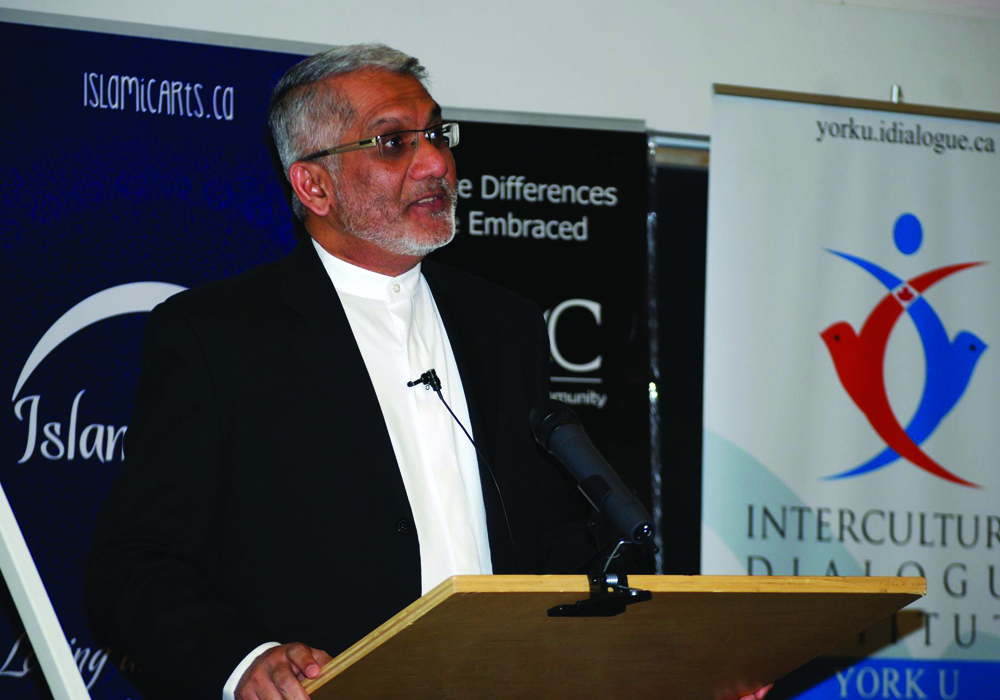Hassam Munir, Sports and Health Editor
Ryan Moore, News Editor
Featured image courtesy of Hasan Ercan
The history of religion and its relationship to violence and persecution is indeed a long one.
Religious clubs and community leaders came together last Wednesday evening to denounce violence done in the name of the three Abrahamic religions.
The event titled, NOT IN GOD’S NAME: Religions Against Religious Violence, consisted of a panel discussion was organized by LOGOS Christian Community, Hillel at York, Islamic Arts at York, and the Intercultural Dialogue Institute York Chapter.
“To be able to speak about different religions at a university campus is something we all take for granted,” said Rabbi Aaron Greenberg, who is also a York alumnus. “Such a positive dialogue is something which I don’t believe we should take for granted.”
Greenberg emphasized the importance of recognizing the tradition of interpreting sacred texts, which can serve as an antidote for religious fundamentalism. “The wonderful texts that we have, whether they are found in the New Testament, the Quran, the Bible, or the Hadith all require very careful interpretation, or they can lead to much harm,” he says. “That is why every text-based religion develops a tradition of interpretation.”
Father Damian MacPherson, who is the director of ecumenical and interfaith affairs for the Roman Catholic Archdiocese of Toronto, spoke on the traditional idea of the just-war that serves a common good.
He identified several conditions that must be met for a war to be just, as they have been deliberated throughout history by Christian theologians, but said that the degree of destruction that modern weaponry can cause leads to new questions about the concept. “The tools of war available today are such a devastating reality that there may not even be such a thing as a just-war,” he explained.
MacPherson encouraged the audience to continue to work to develop positive interfaith relationships. “We should work as if everything depended on our efforts,” he said, “and pray as if everything depended on god.”
The final speaker for the evening, representing the Muslim community, was Muneeb Nasir, executive director of the Cordoba Centre for Civic Engagement and Leadership.
“Every time a Muslim hears of a violent incident being committed anywhere in the world, the first thing we say, the first thing we pray, is that it’s not a Muslim, and that it’s not done in the name of Islam,” said Nasir.
“And this response is a personal testimony that our faith does not teach us to engage in religiously motivated violence.”
He asserted that secular and materialistic factors, such as power, territory, glory, or oil, play a more important role in ostensibly and religiously motivated conflicts than religion does. His talk was followed by a Q&A session in which the panelists had to respond to more specific questions such as the history of interfaith relations.
The groups involved in organizing the event deem it to have been a success, but recognize that there is much more work to be done in this field. “We hoped to dispel the myth of religion as inherently a source of conflict and violence,” says Shiao Chong, director of LOGOS Christian Community.
“We want people to recognize that religion can be a source of unity and peace.”
The event ended after a Muslim woman approached the podium and condemned ISIS, followed by asking Rabbi Greenberg to condemn the state of Israel on behalf of all Jews.
Rabbi Greenberg maintained his pride in the state of Israel and indicated more discussion is needed in order to bring more understanding to a deeply complicated issue.
Excalibur asked if any of the speakers could give a historical example of the three religions being able to coexist in peace. Father MacPherson could not give an example, but indicated that the relationship between the Jews and the Catholics might be at an all time high, considering the vast persecution Jews have faced as a result of Christian doctrine over the centuries, and the Catholic Church’s role in Nazi Germany.
Excalibur asked if any of the speakers could give a historical example of the three religions being able to coexist in peace. Father MacPherson could not give an example, but indicated that the relationship between the Jews and the Catholics might be at an all time high, considering the vast persecution Jews have faced as a result of Christian doctrine over the centuries, and the Catholic Church’s role in Nazi Germany.
Tweet us, @excaliburYU




